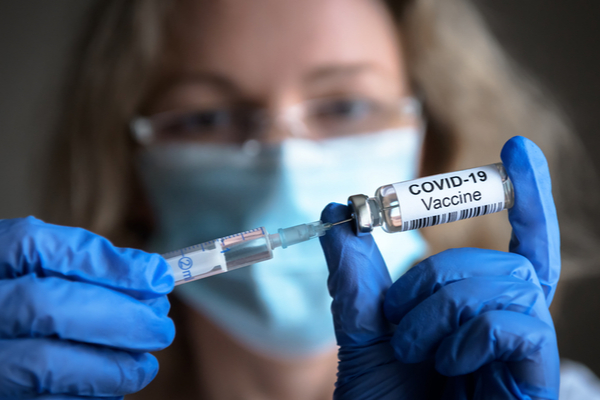The Centers for Disease Control and Prevention (CDC) says that actually extending the time between the first and second doses of COVID-19 vaccines may help reduce the risk of the rare heart-related side effects for some. The new guidance mainly affects Americans who aren’t fully vaccinated against COVID-19—that amounts to roughly 35% of the US population right now. At this point, only about 23% have not received a first dose of any vaccine.
Health magazine reports that some people—especially young men between the ages of 12 and 39—may wait up to eight weeks between doses of the Pfizer-BioNTech and Moderna COVID-19 vaccines. This extended interval could help reduce the risk of developing myocarditis, a rare type of heart inflammation that can affect a small percentage of people who receive mRNA vaccines. “While absolute risk remains small, the relative risk for myocarditis is higher for males ages 12-39 years,” the updated guidance reads. “This risk might be reduced by extending the interval between the first and second dose.”
The new recommendations come following CDC research that found the “small risk of myocarditis” linked with mRNA vaccines “might be reduced, and peak antibody responses and vaccine effectiveness may be increased with an interval longer than four weeks.” However, the CDC says, going beyond eight weeks has not been shown to provide an additional benefit.
This is a change from previous CDC guidance, which was a blanket recommendation that first and second doses of the vaccine be given three to four weeks apart, depending on brand. The CDC still suggests that people who are moderately or severely immunocompromised, are older than 65, or are in need of rapid protection stick to that shortened schedule.
Even thought there is a slight risk of myocarditis as a result of the COVID-19 vaccine, all the experts warn that the risk of developing myocarditis from contracting COVID-19 itself is typically higher and more severe. “There is a fundamental difference between the myocarditis associated with the vaccine and with COVID,” Thomas Russo, MD, professor and chief of infectious disease at the University at Buffalo in New York, told Health. When people develop myocarditis from the vaccine, “it tends to be milder and relatively transient,” Dr. Russo said. “Myocarditis associated with COVID tends to be more severe.”
Despite the slight risk of myocarditis, experts still recommend vaccination. “This is a very, very rare potential complication,” Ehimare Akhabue, MD, cardiologist and assistant professor of medicine at the Rutgers Robert Wood Johnson Medical School, told Health. “If it does occur, most people respond very well to treatment and care, and recover quickly.” Overall, he said the benefits of vaccination “far outweigh the potential risk.”
While data has shown that spacing out the doses can lower the risk of myocarditis, experts don’t yet know why that’s the case. “By allowing the immune system to quiet down over a period of eight weeks, it is speculated that the inflammatory response may be reduced and therefore the risk of myocarditis lessened,” stated Jennifer Haythe, MD, an associate professor of medicine and co-director of Columbia Women’s Heart Center, in an interview with Health. “We really don’t have a full explanation at this point,” Dr. Akhabue said. “However, it’s possible that the spacing may allow your immune system to adapt.”
If you have questions about the COVID-19 vaccine and your myocarditis risk, talk to your health care professional for individualized guidance.
—
Photo Credit: Viacheslav Lopatin / Shutterstock.com
